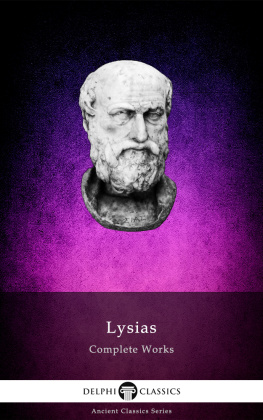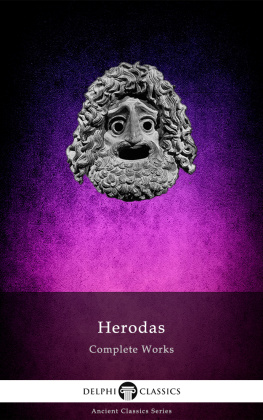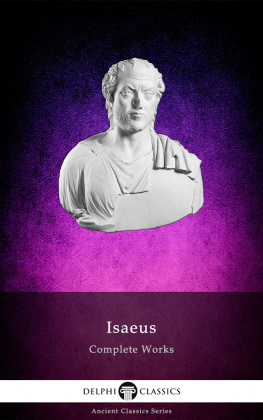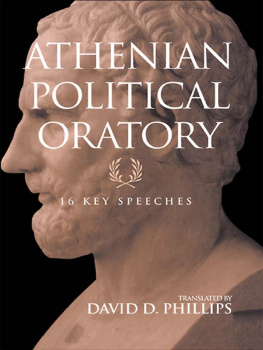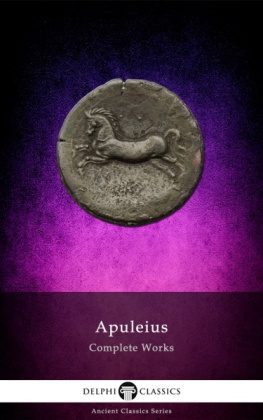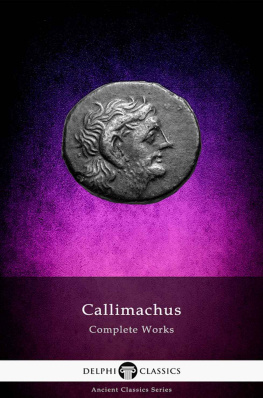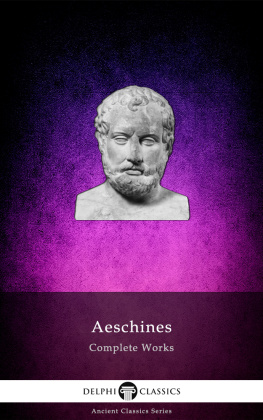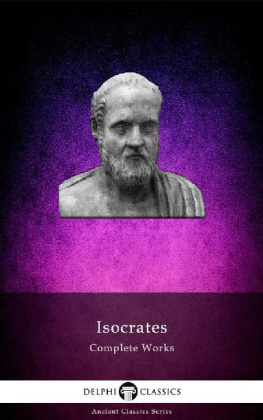The Complete Works of
LYSIAS
(c. 445-c. 380 BC)

Contents

Delphi Classics 2022
Version 1

Browse Ancient Classics







The Complete Works of
LYSIAS

By Delphi Classics, 2022
COPYRIGHT
Complete Works of Lysias

First published in the United Kingdom in 2022 by Delphi Classics.
Delphi Classics, 2022.
All rights reserved. No part of this publication may be reproduced, stored in a retrieval system, or transmitted, in any form or by any means, without the prior permission in writing of the publisher, nor be otherwise circulated in any form other than that in which it is published.
ISBN: 978 1 80170 058 0
Delphi Classics
is an imprint of
Delphi Publishing Ltd
Hastings, East Sussex
United Kingdom
Contact: sales@delphiclassics.com

www.delphiclassics.com
The Translations

The Acropolis of Athens by Leo von Klenze, 1846 Lysias was born in Athens in 459-458 BC.
Brief Introduction to Lysias by Richard Claverhouse Jebb

From 1911 Encyclopdia Britannica, Volume 17
LYSIAS, Attic orator, was born, according to Dionysius of Halicarnassus and the author of the life ascribed to Plutarch, in 459 B.C. This date was evidently obtained by reckoning back from the foundation of Thurii (444 B.C.), since there was a tradition that Lysias had gone thither at the age of fifteen. Modern critics would place his birth later, between 444 and 436 B.C., because, in Platos Republic , of which the scene is laid about 430 B.C., Cephalus, the father of Lysias, is among the dramatis personae , and the emigration of Lysias to Thurii was said to have followed his fathers death. The latter statement, however, rests only on the Plutarchic life; nor can Platos dialogue be safely urged as a minutely accurate authority. The higher date assigned by the ancient writers agrees better with the tradition that Lysias reached, or passed, the age of eighty. Cephalus, his father, was a native of Syracuse, and on the invitation of Pericles had settled at Athens. The opening scene of Platos Republic is laid at the house of his eldest son, Polemarchus, in Peiraeus. The tone of the picture warrants the inference that the Sicilian family were well known to Plato, and that their houses must often have been hospitable to such gatherings.
At Thurii, the colony newly planted on the Tarentine Gulf (see Pericles), the boy may have seen Herodotus, now a man in middle life, and a friendship may have grown up between them. There, too, Lysias is said to have commenced his studies in rhetoric doubtless under a master of the Sicilian school possibly, as tradition said, under Tisias, the pupil of Corax, whose name is associated with the first attempt to formulate rhetoric as an art. In 413 B.C. the Athenian armament in Sicily was annihilated. The desire to link famous names is illustrated by the ancient ascription to Lysias of a rhetorical exercise purporting to be a speech in which the captive general Nicias appealed for mercy to the Sicilians. The terrible blow to Athens quickened the energies of an anti-Athenian faction at Thurii. Lysias and his elder brother Polemarchus, with three hundred other persons, were accused of Atticizing. They were driven from Thurii and settled at Athens (412 B.C.).
Lysias and Polemarchus were rich men, having inherited property from their father; and Lysias claims that, though merely resident aliens, they discharged public services with a liberality which shamed many of those who enjoyed the franchise ( In Eratosth. 20). The fact that they owned house property shows that they were classed as , i.e. foreigners who paid only the same tax as citizens, being exempt from the special tax () on resident aliens. Polemarchus occupied a house in Athens itself, Lysias another in the Peiraeus, near which was their shield manufactory, employing a hundred and twenty skilled slaves. In 404 the Thirty Tyrants were established at Athens under the protection of a Spartan garrison. One of their earliest measures was an attack upon the resident aliens, who were represented as disaffected to the new government. Lysias and Polemarchus were on a list of ten singled out to be the first victims. Polemarchus was arrested, and compelled to drink hemlock. Lysias had a narrow escape, with the help of a large bribe. He slipped by a back-door out of the house in which he was a prisoner, and took boat to Megara. It appears that he had rendered valuable services to the exiles during the reign of the tyrants, and in 403 Thrasybulus proposed that these services should be recognized by the bestowal of the citizenship. The Boul, however, had not yet been reconstituted, and hence the measure could not be introduced to the ecclesia by the requisite preliminary resolution (). On this ground it was successfully opposed.
During his later years Lysias now probably a comparatively poor man owing to the rapacity of the tyrants and his own generosity to the Athenian exiles appears as a hardworking member of a new profession that of writing speeches to be delivered in the law-courts. The thirty-four extant are but a small fraction. From 403 to about 380 B.C. his industry must have been incessant. The notices of his personal life in these years are scanty. In 403 he came forward as the accuser of Eratosthenes, one of the Thirty Tyrants. This was his only direct contact with Athenian politics. The story that he wrote a defence for Socrates, which the latter declined to use, probably arose from a confusion. Several years after the death of Socrates the sophist Polycrates composed a declamation against him, to which Lysias replied. A more authentic tradition represents Lysias as having spoken his own Olympiacus at the Olympic festival of 388 B.C., to which Dionysius I of Syracuse had sent a magnificent embassy. Tents embroidered with gold were pitched within the sacred enclosure; and the wealth of Dionysius was vividly shown by the number of chariots which he had entered. Lysias lifted up his voice to denounce Dionysius as, next to Artaxerxes, the worst enemy of Hellas, and to impress upon the assembled Greeks that one of their foremost duties was to deliver Sicily from a hateful oppression. The latest work of Lysias which we can date (a fragment of a speech For Pherenicus ) belongs to 381 or 380 B.C. He probably died in or soon after 380 B.C.
Next page
